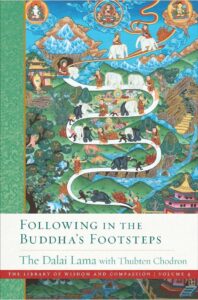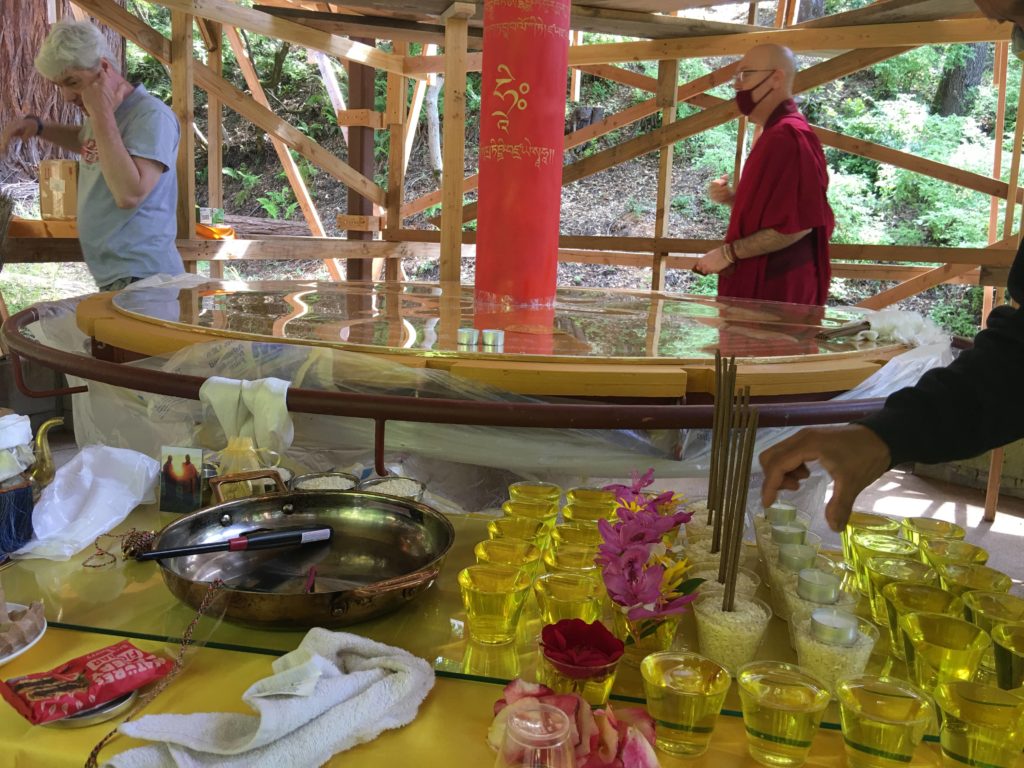ETHICS AT VAJRAPANI INSTITUTE
Vajrapani Institute is dedicated to providing a safe and joyful space of connection, where participants can uncover and make contact with the fullness of their true nature: an infinite source of love, compassion and wisdom. As a spiritual community serving the needs of retreaters in all traditions, we are nurtured by the energy of our Tibetan Buddhist founder Lama Thubten Yeshe and our spiritual director Lama Zopa Rinpoche, by our teachers and holy objects, and by the stillness of the California redwood forest.
Vajrapani Institute for Wisdom Culture is affiliated with the Foundation for the Preservation of the Mahayana Tradition and is dedicated to preserving Lama Tsong Khapa’s rich living tradition of wisdom and compassion.
Purpose
The purpose of the Vajrapani Institute Ethical Policy is to help maintain and foster a supportive environment for Buddhist practice.
The Ethical Policy identifies behaviors attitudes and conduct that Vajrapani Institute considers to be consistent with its commitments to the well-being of others. It is not possible for any ethical policy to identify or include all behaviors, attitudes, conduct, practices or concepts and the existence of an Ethical Policy cannot guarantee that all persons will behave in ways deemed ethical by all other persons. This Ethical Policy is built on a commitment to integrity, truthfulness, and fairness to all persons.
Personal and Organizational Responsibility
A fundamental responsibility of each person in a position of authority within Vajrapani Institute is to uphold an environment that is safe, respectful, and supportive of Dharma practice. In this, each such individual safeguards the community’s well-being and shares in the responsibility to foster a safe environment of integrity and respect. This shared responsibility includes refraining from behavior that harms others or negatively affects the environment in which Dharma is practiced and taught.
Those in positions of authority in the FPMT organization are trusted to behave in ways that further the well-being of their local FPMT community. In addition, these individuals are seen as representing Lama Zopa Rinpoche and the FPMT. They are ambassadors, and their behavior reflects on Rinpoche and FPMT.
Misconduct on the part of persons in positions of power or trust undermines the integrity of the organization, causing demoralization and loss of faith. Hence, the behaviors described in this Ethical Policy are prohibited, and Vajrapani Institute’s Conflict Resolution Procedures shall be put into effect if a breach occurs.
Each individual in a position of authority, within their area of responsibility at Vajrapani Institute, is also required to act on the appearance of misconduct and any complaint of misconduct. It is crucial that individuals in a position of authority identify and communicate concerns about conduct that may be harmful as soon as possible, so that procedures for dealing with problems can be promptly implemented.
Vajrapani Institute’s Ethical Policy applies to all activities, interactions, and communications including those on-line, on social media, by telephone, in person, or by any other means as long as the activity, interaction, or communication in question concerns or pertains to Vajrapani Institute-related activities, duties, or responsibilities. Vajrapani Institute’s Ethical Policy shall be signed by Vajrapani Institute Board members, directors, spiritual program coordinators, resident and visiting teachers, interpreters, introductory class leaders, employees and staff and is applicable to each of those people.
ETHICAL POLICY
- The Five Lay Precepts: The five lay precepts are the foundation of ethics for all persons while in the course and scope of performing duties, responsibilities or actions for, on behalf of, or related to Vajrapani Institute. The five basic rules are not to kill, steal, engage in or commit sexual misconduct, lie, or take intoxicants. Intoxicants include alcohol, recreational drugs, and tobacco products.
- No Discrimination: Vajrapani Institute shall not discriminate in its programs, services, employment, volunteer opportunities, or other activities or benefits on the basis of race, ethnicity, national origin, gender or gender identification, affectional or sexual orientation, marital status, age, or disability.
- No Harassment: Vajrapani Institute is committed to promoting safe environments wherein the dignity of every individual is respected. Everyone participating in Vajrapani Institute-related activities has the right to be, and shall be, free from harassment of any type, be it sexual harassment, intimidation, bullying, or harassment based on race, color, religion, sex (including gender identity and pregnancy), national origin, age, disability, genetic information, sexual orientation, or parental status. Everyone coming into contact with Vajrapani Institute shall be treated with dignity and respect.
- Relationships: Sexual relationships between Dharma teachers and students while a student is attending the teacher’s teachings, course or retreat are prohibited, and are strongly discouraged at all other times as long as there is a Dharma teacher-student relationship. Please see below for additional guidelines that apply specifically to Dharma teachers. People in positions of authority are also strongly discouraged from entering into sexual relationships in situations where there may be a real or perceived power imbalance. Vajrapani Institute staff shall never use, or create the appearance of using, their authority or position to pursue or initiate sexual relationships with other staff members, volunteers, or participants in any Vajrapani Institute program. As well, no teacher, volunteer, staff member, or other representative of the hosting center shall make sexual advances to any participant during a teaching, course or retreat. Furthermore as a way of achieving a contemplative atmosphere and out of respect for the monastic residents and guests of Vajrapani Institute, if you are in a relationship with someone on the staff or on the 2 property, please be mindful of hand holding, kissing, back rubbing, or any other physical contact with the person with whom you are in a relationship.
- Personal Appearance: The personal appearance of the staff is important, because staff are representatives of Vajrapani Institute. Vajrapani staff should avoid extremes in clothing, such as avoiding clothing that is revealing and tight-fitting (i.e., exposing midriffs, cleavage, short shorts, shirts off for men) out of respect for the guests and residents, both monastic and lay, of Vajrapani Institute.
- Right Speech: Those in positions of authority must avoid gossip and harsh or abusive language. Communicating conversations in which others are disparaged can have a negative impact on those involved in Vajrapani Institute activities. Harsh or abusive language may also constitute harassment or bullying.
- Finances: All income and expenditure in FPMT affiliates shall be accounted for according to generally accepted accounting principles or other commonly recognized comprehensive basis of accounting. Money that has been donated for a specific project must be used for the project it has been donated for, and not for operating expenses or other projects. Income from the sale of Dharma items must be used for Dharma purposes, not for operating or other expenses.
- Whistleblower Protection: If an individual or group believes that a practice or activity within Vajrapani Institute is illegal and/or against this Vajrapani Instiute Ethical Policy, and brings their concern to the relevant management, that individual or group shall be protected from retaliation.
Additional Policy for FPMT Registered Teachers, Class Leaders, and Interpreters Because of the uniqueness of the teacher-student relationship, FPMT registered teachers, interpreters, and introductory class leaders are required to observe the following additional policy:
- Confidentiality: In any situations where disclosures are made by students with a stated expectation of privacy, including but not limited to during private interviews, teachers, interpreters, and class leaders shall respect the confidentiality of students, and treat all communications from students as confidential, not disclosing information acquired from students without the consent of the student. However, if a participant discloses information that could put them or anyone else in danger or that involves unethical practices by any individual, great care shall be taken in deciding whether or not to disclose this information, in order to protect the community or the individual.According to California law, clergy are mandated reporters of child abuse and neglect, unless the information is acquired during a “penitential communication,” meaning “a communication, intended to be in confidence, including, but not limited to, a sacramental confession, made to a clergy member who, in the course of the discipline or practice of his or her church, denomination, or organization, is authorized or accustomed to hear those communications, and under the discipline, tenets, customs, or practices of his or her church, denomination, or organization, has a duty to keep those communications secret.” (Citation from California Cal. Penal Code § 11166(d)) However, when the clergy member is acting in some other capacity than in the role of hearing such penitential communication, they are required to report known or suspected child abuse.
- Honesty: Dharma teachers and class leaders are to be honest about their qualifications, and shall correct any misrepresentation of their qualifications as soon as it comes to their attention.
- Avoiding Inappropriate Relationships: Dharma teachers and class leaders shall not engage in a sexual relationship or communicate an interest in doing so while a student is attending the teacher’s course, teachings, or retreat. Dharma teachers and class leaders must never use, or create the appearance of using, their authority or position to pursue or initiate sexual relationships with students, volunteers, or other participants in teachings, courses, or retreats.
ADMINISTERING THE VAJRAPANI INSTITUTE ETHICAL POLICY UPDATES TO THE ETHICAL POLICY
The Board of Directors of Vajrapani Institute may modify the Ethical Policy from time to time. Any updates shall supersede in whole or in part the earlier Ethical Policy. Signatories to an earlier version of the Policy will be considered bound by updated versions provided that Vajrapani Institute communicates updates in a reasonable time and manner.
SIGNING AND STORING THE ETHICAL POLICY ACKNOWLEDGEMENT FORM
Center, project and service board members, resident geshes or teachers, introductory class leaders, non-Dharma teachers, interpreters, employees, and all others in a position of authority at a center, service, or project are to sign the Ethical Policy form acknowledging and agreeing to abide by the Vajrapani Institute Ethical Policy, and to return their signature slip to the Vajrapani Institute director.
INFORMING PARTICIPANTS ABOUT THE VAJRAPANI INSTITUTE ETHICAL POLICY
The Ethical Policy should be included in all staff and volunteer training, as well as the information that Vajrapani Institute abides by this policy, and has a set of grievance procedures to be followed in case of need.
RESPONSE TO ALLEGATIONS OF A BREACH OF THE ETHICAL POLICY
It is the FPMT and Vajrapani Institute’s policy that all complaints of alleged ethical misconduct shall be investigated thoroughly and promptly. Please see Vajrapani Institute’s Conflict Resolution Procedures for the steps to follow if such a situation occurs.
To report a breach of the ethical policy, or abuse, please contact one of the following designated protection persons (DPP). The contact information of a DPP can be found in our main office, or by emailing office@vajrapani.org
Designated Protection Persons (DPPs):
- Joe Monahan, Executive Director
- Beth Dart, Board Member









